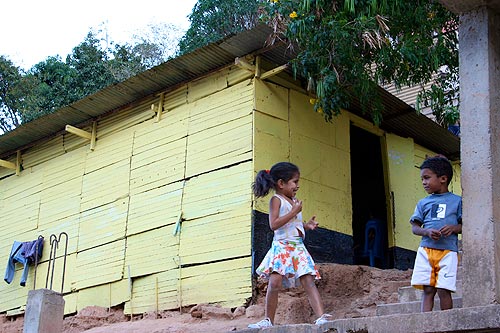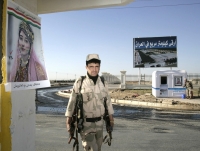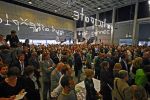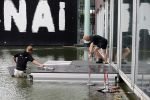Th 15 Jan 09 - Fr 16 Jan 09
Refuge Urbanism: IABR workshop in Istanbul
International Research Network Istanbul, Beirut, Amman, Cairo and Dubai
Workshop, January 15-16, 2009
Hosted by Bilgi University, Istanbul
Hosted by Bilgi University, Istanbul
In the Summer of 2008, Can Altay and Philipp Misselwitz invited leading urban experts and researchers to jointly embark on a collaborative research inquiry into the way the physical and socioeconomic texture of the contemporary cities in the Turkey/ Middle East region is conditioned and transformed by the principle of “refuge”.
The research was guided by the following questions: What physical manifestations of processes of barricading, fortification, gating, voluntary and involuntary exclusion and segregation can be detected that change the way we inhabit and use the city, move through it and interact with each other? What spatial typologies emerge in the urban transformation processes in these cities? What are the morphological elements of the emerging texture and how are they separated, linked or engaged with each other? Are the emerging typologies specific/ local or generic/ global? How do contextual factors such as political regimes, economic systems, conflicts, migration patterns, and economic forces change and adapt generic patterns and typologies? What new forms of “common” or “collective” spaces emerge and what role can architecture and planning assume to generate new connections, modes of contact and exchange in the splintering and spatially fragmented city?
The preliminary list of research indicators circulated in September 2008 was an attempt to translate these questions into an (incomplete) checklist that could potentially be applied to all five cities: Istanbul, Beirut, Amman, Cairo and Dubai.
The aim of the research collaboration was and is to jointly develop an extensive exhibition display. This display will form a core part of a larger exhibition, “Refuge Urbanism” curated by Can Altay and Philipp Misselwitz. “Refuge Urbanism” is one out of six independent exhibitions under the shared theme “Open City – Designing Coexistence” at the International Architecture Biennale Rotterdam (September 2009), which have been commissioned by the IABR’s main curator Kees Christiaanse and Tim Rieniets. After the end of the Biennale (January 2010) the display will be free to tour to the cities in the region. Currently the possibility to show the display in Istanbul as part of a major show curated by Ihsan Bilgin for Istanbul European Cultural Capital celebrations in 2010 is being discussed.
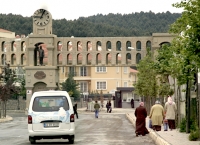
The main aim of the January workshop is to jointly develop an exhibition concept, which will guide the research over the next months.
The preliminary list of research indicators circulated in September 2008 was an attempt to translate these questions into an (incomplete) checklist that could potentially be applied to all five cities: Istanbul, Beirut, Amman, Cairo and Dubai.
The aim of the research collaboration was and is to jointly develop an extensive exhibition display. This display will form a core part of a larger exhibition, “Refuge Urbanism” curated by Can Altay and Philipp Misselwitz. “Refuge Urbanism” is one out of six independent exhibitions under the shared theme “Open City – Designing Coexistence” at the International Architecture Biennale Rotterdam (September 2009), which have been commissioned by the IABR’s main curator Kees Christiaanse and Tim Rieniets. After the end of the Biennale (January 2010) the display will be free to tour to the cities in the region. Currently the possibility to show the display in Istanbul as part of a major show curated by Ihsan Bilgin for Istanbul European Cultural Capital celebrations in 2010 is being discussed.

The main aim of the January workshop is to jointly develop an exhibition concept, which will guide the research over the next months.
Made possible by
Bilgi University
4th IABR
Municipality of Istanbul
Biographies of Participants
Research Collaborators (in alphabetical order)
Can Altay received his Ph.D. in Art, Design, and Architecture from Bilkent University, Turkey, in 2004, with a research on state-driven mass housing projects in Turkey, focusing on the variety of actors involved in the process. As an academic he has taught mainly in architecture and design schools in Turkey, and at the AA Winter school in Dubai, 2008. As an artist, his installations of videos, mappings, textbooks and photographs incorporate loose forms of research in urban environments. To create these dense works Altay studies symptoms of ‚mis-use‘, or improvised spatial architectures in the city, as well as hidden structures of support, unauthorised systems of organisation and models of co-habitation. His works have been included in various biennials around the world and in art spaces such as the Walker Art Centre (USA), ZKM (Germany), P.S.1 MOMA (USA), and Platform Garanti (Turkey).
Yasser El-Sheshtawy is Associate Professor of Architecture at the United Arab Emirates University. He holds a Ph.D. in Architecture from the University of Wisconsin-Milwaukee. His most recent research fo¬cus has been on changing urban patterns in Middle Eastern cities with a particular focus on the cities of Dubai and Abu Dhabi. He has published in numerous international journals and attended conferences worldwide. His most recent publication is “The evolving Arab city” which follows the 2004 book “Plan¬ning Middle Eastern Cities” – both published by Routledge. He is also authoring a book on the urban development of Dubai, to be published in 2008. He has been invited to present his work at Harvard De¬sign School, Tianjin University-China, Notre Dame University-Beirut; Tongji University-Shanghai, and Virginia Commonwealth University-Doha.
Rami Farouk Daher, born in Amman, Jordan on May 5, 1965, is a practicing architect (heading his own firm: TURATH) and an academic (currently working as an associate professor of Architecture at German Jordanian University in Amman). Daher had also taught at the American University of Beirut's Department of Architecture & Design and at Jordan UN. of Science & Tech (holding position of Department Head between 2003-6). Daher is a heritage and urban regeneration specialist interested in research related to politics and dynamics of public space making and heritage conservation and urban regeneration. He holds a Ph. D. in architecture (1995) from Texas A&M University, a Masters of architecture (1991) from the University of Minnesota, and a Bachelor of architecture (1988) from the University of Jordan. Daher is also a recipient of a Certificate in Historic Preservation (1995) from the College of Architecture at Texas A&M University. Since 1999, Daher has been appointed as a faculty Fellow at the Center for Heritage Conservation, College of Architecture, Texas A&M University. And since 2002 Daher has been appointed as a Visiting Research Fellow at the Center for Tourism and Cultural Change at Leeds Metropolitan University, UK. Daher was awarded a Fulbright Visiting Scholar Fellowship, he served as a Research Associate at the Center for Middle Eastern Studies at the University of California, Berkeley (2001). In addition, Daher has been awarded (2002) an International Collaborative Research Grant (ICRG) from the Program on the Middle East & North Africa (MENA) of the Social Science Research Council (SSRC).
Daher held the position of a research architect at Rasem Badran's architectural Office in Amman (1988-89). He also held teaching positions at the University of Minnesota's College of Architecture and Landscape Architecture (1990), and at Texas A&M University's College of Architecture (1993-95). Daher had worked as a consultant for several heritage management and urban regeneration projects all over Jordan in Amman, Salt, Kerak, Umm Qais, Ajloun, and Jerash and in other places outside of Jordan as well in Lebanon, Syria, Bahrain & Qatar. Daher is a co-founder and a principal of TURATH: Architecture & Urban Design Consultants (1999-present), and Metropolis: Cities Research Council (2008- Present) which is considered the research arm of TURATH. Daher had organized several local and International conferences on heritage conservation, urban regeneration, and heritage tourism. In addition, he had also organized and authored several Architecture and Travel students trips to Damascus (2004), Lebanon (2006), and Barcelona (2008). In addition to heritage conservation & urban regeneration, he is also interested in landscape urbanism and contemporary public space design, heritage tourism, cultural site management, Ottoman history of Bilad al Sham, epistemologies, critical theories and cultural studies
Mona Fawaz, born in 1972, PhD, Urban Planning, M.I.T. Massachusets Institute of Technology (2004); MSc, City and Regional Planning, M.I.T. Massachusets Institute of Technology (1998); Bachelor’s Degree in Architecture, AUB (1995); currently teaches at the American University of Beirut, Lebanon.
Murat Güvenç is a Professor of Urban Geography and Planning at the Boga¬zici University and member of the Academ¬ic Board of Bilgi University, Istanbul. He was born in 1953 in Ankara. Murat Güvenç received his PhD in City and Regional Planning from M.E.T.U. (Middle East Technical University) and has been part of the Faculty there for 28 years, before moving to İstanbul to join the Academic Staff of Bilgi University. He is a renowned urban geographer and re¬searcher. He has worked and taught on planning, urban geography, theory, and history. His Social At¬las of İstanbul research project includes invaluable information on the city of İstanbul, especially from years 1900 to 2000. Besides being on Academic Board of Bilgi University, he is also teaching in Boga¬zici University.
Tansel Korkmaz is an associate professor in the Graduate School of Architecture, İstanbul Bilgi University. Her research areas include the history and theory of modern architecture, historiography of architecture, and architectural criticism. She is the author of the monograph Nevzat Sayın: Düs¸ler, Is¸ler, Düs¸ünceler (Nevzat Sayın: Visions, Works, Thoughts) (Istanbul, 2004) and the editor of Architecture in Turkey around 2000: Issues in Discourse and Practice (Ankara, 2005).
Philipp Misselwitz is an architect and curator based in Istanbul. He was educated at Cambridge University and the Architectural Association London and has taught at the University of North London, the AA and the University of the Arts Berlin. He is a founding member of the Berlin based architectural research group ‚Urban Catalyst‘ which serves as a platform for research activities, exhibitions, publications and debates (www.urbancatalyst.net). Philipp Misselwitz has participated in several research projects on the Israeli-Palestinian conflict including ‘Conflict in Cities’ (University of Cambridge). In 2002, he initiated the project ‘Geographies of Conflict’ which led to the publication ‘City of Collision – Jerusalem and the Principles of Conflict Urbanism (co-edited with Tim Rieniets, 2006). Together with Nikolaus Hirsch, Markus Miessen and Matthias Görlich he led the research project ‚spaces of production‘ on behalf of the European Kunsthalle Cologne (www.eukunsthalle.com). Curatorial activities include ‚Shrinking Cities‘ (local curator for case study Manchester-Liverpool, 2003-04) and Liminal Spaces (with Reem Fadda, Eyal Danon, Galit Eilat) including conferences in Ramallah, Jerusalem, Jaffa and a conference/ exhibition in Leipzig, Germany. From 2005, he is a member of SIAAl research group (Department of Urban Planning in Africa, Asia and Latin America at the University of Stuttgart) where he initiated and now leads an extensive UN-funded research project which investigates the urban and cultural conditions in refugee camps and develops strategic planning methodologies and direct action projects. Philipp Misselwitz is a Ph.D. candidate at the University of Stuttgart.
Martina Rieker is co-founder and co-coordinator (with Kamran Asdar Ali) of the Shehr Comparative Ur¬ban Landscapes Network (www.shehr.org). Founded in 2001 the Shehr network is an academic initia¬tive that seeks to further a social-historical and critical understanding of contemporary cities and urban practices in the Middle East, South Asia and Africa. The initiative examines the efficacy of the category of the city in modernist discourse and seeks to chart this spatial imagination and its effects through an exploration of the complex processes through which gendered, classed, and raced citizen-subjects have negotiated and been the object of urban projects in these regions. Attuned to both the legacy of modernist conceptual grammars and their inadequacy for understanding the remaking of space and place in the neo-liberal present, the purpose of the network is to open up an arena in which to address the particular positioning(s) of contemporary urban landscapes and urban practices through theme-based workshops, publications and an on-line discussion and exchange forum. The following three publications edited by Martina Rieker and Kamran Asdar Ali have been published so far: Gendering Urban Space Ed. Kamran Ali and Martina Rieker (Palgrave, 2008), “Urban Marginality” Guest EditedJournal Issue. Social Text (Spring 2008) Comparing Cities: South Asia/ Middle East. Ed. Kamran Ali and Martina Rieker (Oxford University Press, forthcoming Fall 2008). An additional volume on neolib¬eralism and urban transformation is in process. Martina Rieker teaches at the American University, Cairo.
Dina Shehayeb, born in 1962; PhD, Architecture, University of Wisconsin - Milwaukee (1995); Masters’ Degree in Architecture, Cairo University (1989); Undergraduate Degree in Architecture, Cairo University (1984). Dina Shehayeb practices as consultant (private practice) in the field of research-based design and planning, and community-based urban development; is a Professor/Researcher at the Housing and Building National Research Center (HBRC); as well as working as part-time faculty member at the Department of Construction and Architectural Engineering at the American University in Cairo (AUC) – Cairo, Egypt.
Guest:
Farrokh Derakshani, M. Arch. - Director of Award Procedures, the Aga Khan Award for Architecture, Geneva-Switzerland.
Istanbul Expert and Responsible for Guided Tour on Workshop Day 01:
Orhan Esen (*1960, Istanbul) studied social and economic history at Bosporus University and history of art and architecture in Vienna. As an activist and researcher, his main interest is Istanbul’s rapid urban development and its social, political, and ecological effect. As a freelancer, he collaborates with a wide range of academic, civic, media, and corporate bodies in research projects, seminars, workshops, and field trips. With “performance without licence” / “ehliyetsiz performans” (2001, Istanbul) he intervened into the political debate on urban mobility. He has recently co-edited the book Istanbul: Self Service City (2005), dealing with informal aspects of Istanbul’s urbanisation process.
Information Design Consultant:
Matthias Görlich is a Darmstadt- and Zurich-based communication designer, educator and researcher. In 2000, he set up and currently directs his own design studio as a platform for research, education, design and communication strategy. He worked on many international projects and consultancies including a commission by the United Nations to accompany a research and planning project for the improvement of living conditions in Palestine refugee camps. He currently teaches information visualization at the University of Darmstadt and directs a postgraduate programme on the development of design-strategies for a new Civic City based at the University for the Arts, Zurich. He also initiated "White Spots Black Holes", a research-project on the role of mapping in political contexts, which is located at the Institute Design2Context at the University for the Arts, Zurich.
Film Consultant:
Anne Misselwitz is a cinematographer who studied at the London College of Communication Film and Video (1998-2001) and the Hochschule für Film und Fernsehen „Konrad Wolf“ in Potsdam (2002-2007). Her main interest is documentary film making and she engaged in many award winning projects in Iran, Turkey, Palestine, Poland and Germany. She has also directed her own films such as “Belgrade Backspin” (2005) and “Twilight” (2001).
Bilgi University
4th IABR
Municipality of Istanbul
Biographies of Participants
Research Collaborators (in alphabetical order)
Can Altay received his Ph.D. in Art, Design, and Architecture from Bilkent University, Turkey, in 2004, with a research on state-driven mass housing projects in Turkey, focusing on the variety of actors involved in the process. As an academic he has taught mainly in architecture and design schools in Turkey, and at the AA Winter school in Dubai, 2008. As an artist, his installations of videos, mappings, textbooks and photographs incorporate loose forms of research in urban environments. To create these dense works Altay studies symptoms of ‚mis-use‘, or improvised spatial architectures in the city, as well as hidden structures of support, unauthorised systems of organisation and models of co-habitation. His works have been included in various biennials around the world and in art spaces such as the Walker Art Centre (USA), ZKM (Germany), P.S.1 MOMA (USA), and Platform Garanti (Turkey).
Yasser El-Sheshtawy is Associate Professor of Architecture at the United Arab Emirates University. He holds a Ph.D. in Architecture from the University of Wisconsin-Milwaukee. His most recent research fo¬cus has been on changing urban patterns in Middle Eastern cities with a particular focus on the cities of Dubai and Abu Dhabi. He has published in numerous international journals and attended conferences worldwide. His most recent publication is “The evolving Arab city” which follows the 2004 book “Plan¬ning Middle Eastern Cities” – both published by Routledge. He is also authoring a book on the urban development of Dubai, to be published in 2008. He has been invited to present his work at Harvard De¬sign School, Tianjin University-China, Notre Dame University-Beirut; Tongji University-Shanghai, and Virginia Commonwealth University-Doha.
Rami Farouk Daher, born in Amman, Jordan on May 5, 1965, is a practicing architect (heading his own firm: TURATH) and an academic (currently working as an associate professor of Architecture at German Jordanian University in Amman). Daher had also taught at the American University of Beirut's Department of Architecture & Design and at Jordan UN. of Science & Tech (holding position of Department Head between 2003-6). Daher is a heritage and urban regeneration specialist interested in research related to politics and dynamics of public space making and heritage conservation and urban regeneration. He holds a Ph. D. in architecture (1995) from Texas A&M University, a Masters of architecture (1991) from the University of Minnesota, and a Bachelor of architecture (1988) from the University of Jordan. Daher is also a recipient of a Certificate in Historic Preservation (1995) from the College of Architecture at Texas A&M University. Since 1999, Daher has been appointed as a faculty Fellow at the Center for Heritage Conservation, College of Architecture, Texas A&M University. And since 2002 Daher has been appointed as a Visiting Research Fellow at the Center for Tourism and Cultural Change at Leeds Metropolitan University, UK. Daher was awarded a Fulbright Visiting Scholar Fellowship, he served as a Research Associate at the Center for Middle Eastern Studies at the University of California, Berkeley (2001). In addition, Daher has been awarded (2002) an International Collaborative Research Grant (ICRG) from the Program on the Middle East & North Africa (MENA) of the Social Science Research Council (SSRC).
Daher held the position of a research architect at Rasem Badran's architectural Office in Amman (1988-89). He also held teaching positions at the University of Minnesota's College of Architecture and Landscape Architecture (1990), and at Texas A&M University's College of Architecture (1993-95). Daher had worked as a consultant for several heritage management and urban regeneration projects all over Jordan in Amman, Salt, Kerak, Umm Qais, Ajloun, and Jerash and in other places outside of Jordan as well in Lebanon, Syria, Bahrain & Qatar. Daher is a co-founder and a principal of TURATH: Architecture & Urban Design Consultants (1999-present), and Metropolis: Cities Research Council (2008- Present) which is considered the research arm of TURATH. Daher had organized several local and International conferences on heritage conservation, urban regeneration, and heritage tourism. In addition, he had also organized and authored several Architecture and Travel students trips to Damascus (2004), Lebanon (2006), and Barcelona (2008). In addition to heritage conservation & urban regeneration, he is also interested in landscape urbanism and contemporary public space design, heritage tourism, cultural site management, Ottoman history of Bilad al Sham, epistemologies, critical theories and cultural studies
Mona Fawaz, born in 1972, PhD, Urban Planning, M.I.T. Massachusets Institute of Technology (2004); MSc, City and Regional Planning, M.I.T. Massachusets Institute of Technology (1998); Bachelor’s Degree in Architecture, AUB (1995); currently teaches at the American University of Beirut, Lebanon.
Murat Güvenç is a Professor of Urban Geography and Planning at the Boga¬zici University and member of the Academ¬ic Board of Bilgi University, Istanbul. He was born in 1953 in Ankara. Murat Güvenç received his PhD in City and Regional Planning from M.E.T.U. (Middle East Technical University) and has been part of the Faculty there for 28 years, before moving to İstanbul to join the Academic Staff of Bilgi University. He is a renowned urban geographer and re¬searcher. He has worked and taught on planning, urban geography, theory, and history. His Social At¬las of İstanbul research project includes invaluable information on the city of İstanbul, especially from years 1900 to 2000. Besides being on Academic Board of Bilgi University, he is also teaching in Boga¬zici University.
Tansel Korkmaz is an associate professor in the Graduate School of Architecture, İstanbul Bilgi University. Her research areas include the history and theory of modern architecture, historiography of architecture, and architectural criticism. She is the author of the monograph Nevzat Sayın: Düs¸ler, Is¸ler, Düs¸ünceler (Nevzat Sayın: Visions, Works, Thoughts) (Istanbul, 2004) and the editor of Architecture in Turkey around 2000: Issues in Discourse and Practice (Ankara, 2005).
Philipp Misselwitz is an architect and curator based in Istanbul. He was educated at Cambridge University and the Architectural Association London and has taught at the University of North London, the AA and the University of the Arts Berlin. He is a founding member of the Berlin based architectural research group ‚Urban Catalyst‘ which serves as a platform for research activities, exhibitions, publications and debates (www.urbancatalyst.net). Philipp Misselwitz has participated in several research projects on the Israeli-Palestinian conflict including ‘Conflict in Cities’ (University of Cambridge). In 2002, he initiated the project ‘Geographies of Conflict’ which led to the publication ‘City of Collision – Jerusalem and the Principles of Conflict Urbanism (co-edited with Tim Rieniets, 2006). Together with Nikolaus Hirsch, Markus Miessen and Matthias Görlich he led the research project ‚spaces of production‘ on behalf of the European Kunsthalle Cologne (www.eukunsthalle.com). Curatorial activities include ‚Shrinking Cities‘ (local curator for case study Manchester-Liverpool, 2003-04) and Liminal Spaces (with Reem Fadda, Eyal Danon, Galit Eilat) including conferences in Ramallah, Jerusalem, Jaffa and a conference/ exhibition in Leipzig, Germany. From 2005, he is a member of SIAAl research group (Department of Urban Planning in Africa, Asia and Latin America at the University of Stuttgart) where he initiated and now leads an extensive UN-funded research project which investigates the urban and cultural conditions in refugee camps and develops strategic planning methodologies and direct action projects. Philipp Misselwitz is a Ph.D. candidate at the University of Stuttgart.
Martina Rieker is co-founder and co-coordinator (with Kamran Asdar Ali) of the Shehr Comparative Ur¬ban Landscapes Network (www.shehr.org). Founded in 2001 the Shehr network is an academic initia¬tive that seeks to further a social-historical and critical understanding of contemporary cities and urban practices in the Middle East, South Asia and Africa. The initiative examines the efficacy of the category of the city in modernist discourse and seeks to chart this spatial imagination and its effects through an exploration of the complex processes through which gendered, classed, and raced citizen-subjects have negotiated and been the object of urban projects in these regions. Attuned to both the legacy of modernist conceptual grammars and their inadequacy for understanding the remaking of space and place in the neo-liberal present, the purpose of the network is to open up an arena in which to address the particular positioning(s) of contemporary urban landscapes and urban practices through theme-based workshops, publications and an on-line discussion and exchange forum. The following three publications edited by Martina Rieker and Kamran Asdar Ali have been published so far: Gendering Urban Space Ed. Kamran Ali and Martina Rieker (Palgrave, 2008), “Urban Marginality” Guest EditedJournal Issue. Social Text (Spring 2008) Comparing Cities: South Asia/ Middle East. Ed. Kamran Ali and Martina Rieker (Oxford University Press, forthcoming Fall 2008). An additional volume on neolib¬eralism and urban transformation is in process. Martina Rieker teaches at the American University, Cairo.
Dina Shehayeb, born in 1962; PhD, Architecture, University of Wisconsin - Milwaukee (1995); Masters’ Degree in Architecture, Cairo University (1989); Undergraduate Degree in Architecture, Cairo University (1984). Dina Shehayeb practices as consultant (private practice) in the field of research-based design and planning, and community-based urban development; is a Professor/Researcher at the Housing and Building National Research Center (HBRC); as well as working as part-time faculty member at the Department of Construction and Architectural Engineering at the American University in Cairo (AUC) – Cairo, Egypt.
Guest:
Farrokh Derakshani, M. Arch. - Director of Award Procedures, the Aga Khan Award for Architecture, Geneva-Switzerland.
Istanbul Expert and Responsible for Guided Tour on Workshop Day 01:
Orhan Esen (*1960, Istanbul) studied social and economic history at Bosporus University and history of art and architecture in Vienna. As an activist and researcher, his main interest is Istanbul’s rapid urban development and its social, political, and ecological effect. As a freelancer, he collaborates with a wide range of academic, civic, media, and corporate bodies in research projects, seminars, workshops, and field trips. With “performance without licence” / “ehliyetsiz performans” (2001, Istanbul) he intervened into the political debate on urban mobility. He has recently co-edited the book Istanbul: Self Service City (2005), dealing with informal aspects of Istanbul’s urbanisation process.
Information Design Consultant:
Matthias Görlich is a Darmstadt- and Zurich-based communication designer, educator and researcher. In 2000, he set up and currently directs his own design studio as a platform for research, education, design and communication strategy. He worked on many international projects and consultancies including a commission by the United Nations to accompany a research and planning project for the improvement of living conditions in Palestine refugee camps. He currently teaches information visualization at the University of Darmstadt and directs a postgraduate programme on the development of design-strategies for a new Civic City based at the University for the Arts, Zurich. He also initiated "White Spots Black Holes", a research-project on the role of mapping in political contexts, which is located at the Institute Design2Context at the University for the Arts, Zurich.
Film Consultant:
Anne Misselwitz is a cinematographer who studied at the London College of Communication Film and Video (1998-2001) and the Hochschule für Film und Fernsehen „Konrad Wolf“ in Potsdam (2002-2007). Her main interest is documentary film making and she engaged in many award winning projects in Iran, Turkey, Palestine, Poland and Germany. She has also directed her own films such as “Belgrade Backspin” (2005) and “Twilight” (2001).
